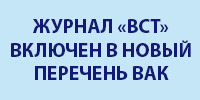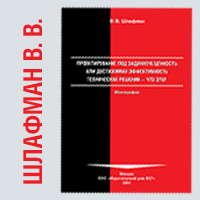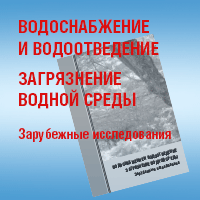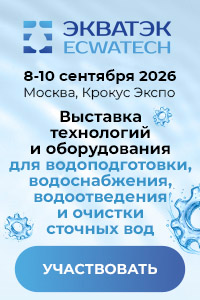№8|2022
WASTE MANAGEMENT
DOI 10.35776/VST.2022.08.07
UDC 628.32:66.081.63
Solid waste landfill leachate treatment and utilization of reverse osmosis reject water
Summary
The leachate of solid water municipal landfills contains high concentrations of organic waste decomposition products and mineral salts. COD concentrations in organic substances can reach 5,000 mg/l; of ammonium ions – 2,500 mg/l; of total dissolved salts – 15,000 mg/l. In order to meet the current regulations on the discharges into the environment including fishery water bodies, the treatment of such wastes by two- or three-stage reverse osmosis is required. The performance of modern reverse osmosis membranes designed for demineralization of groundwater and sea water is low due to high salinity and COD levels in wastewater. Experimentally, the main dependences of the required reject water flow on the degree of ammonium ion removal were obtained. The use of nanofiltration membranes provides for reducing the reject water flow and operating costs. For the utilization of the reverse osmosis reject water, separating the waste flow into the following streams is proposed: with a high concentration of organic substances and with a high concentration of mineral salts, such as sodium and ammonium chlorides.
Key words
reverse osmosis , membrane selectivity , municipal solid waste landfill leachate , permeate yield increase , membrane performance decrease , membrane replacement expenditures
The further text is accessible on a paid subscription.
For authorisation enter the login/password.
Or subscribe
REFERENCES
- Wilf M. The guidebook to membrane for wastewater reclamation. Balaban Desalination Publishing, 2010, 788 p.
- Weber B., Holz F. Landfill leachate treatment by reverse osmosis. Elsevier Science Puplishers Ltd, England. Effective Industrial Membrane Processes – Benefits and opportunities, 1991, pp. 143–154.
- Chiannese A., Ranauro R., Verdone N. Treatment of landfill leachate by reverse osmosis. Water Research, February 2013, v. 33 (3), pp. 647–652. DOI: 10.1016/S0043-134(98)00240-1.
- Mariam T., Nghiem L. D. Landfill leachate treatment using hybrid coagulation-nanofiltration processes. Desalination, 2010, v. 250, pp. 677–681.
- Ширкова Т. Н. Разделение концентрата установок очистки фильтратов ТБО на растворы органических веществ и хлориды аммония: Сборник докладов XVI Международной научно-технической конференции, посвященной памяти академика РАН С. В. Яковлева. Москва, 15 марта 2020 г. – М., 2021. С. 265–272.
Shirkova T. N. [Separation of reject flow from Solid waste landfill leachate treatment into organic solutions and ammonium chlorides]. Book of reports of XVI International Scientific and Technical Conference Dedicated to the Memory of S. V. Iakovlev, Academician of RAS. Moscow, 2021, pp. 265–272. (In Russian). - Sun W. Y., Kang M. S., Yim S. K. Choi K. H. Advances Landfill Leachate treatment using an integrated membrane processes. Desalination, 2002, v. 149, pp. 109–114.
- Hilal N., Al-Zoubi H., Mohammad A. W., Darwish N. A. Nanofiltration of highly concentrated salt solutions up to seawater salinity. Desalination, 2005, v. 184, is. 1–3, pp. 315–326.
- Abdulhussain A. Abbas, Guo Jingsong, Liu Zhi Ping, Pan Ying Ya and Wisaam S. Al-Rekabi: Review on Landfill Leachate Treatments. American Journal of Applied Sciences, 2009, 6(4):672684.
- Pervov A. G., Shirkova T. N. Treatment of municipal landfill leachate with low pressure reverse osmosis and nanofiltration membranes. Book of abstracts. SinoRussian AS.RTU Forum, Ecology and Environmental Sciences, October 21–22, 2020, Ekaterinburg, Russia (Association of Sino-Russian Technical Universities).
- Shirkova T., Pervov A., Kiryushina M. Development of a new technique to treat municipal waste landfill leachate with low pressure reverse osmosis and nanofiltration membranes. ESU (Euroasia-Science), 2020, no. 5 (74), part 4. DOI: 0.31618/ESU.2413-9335.2020.4.74/4.
- Dong Zhou, Lijing Zhu, Yinyi Fu, Minghe Zhu, Lixin Xue. Development of lower cost seawater desalination processes using nanofiltration technologies. Desalination, 2015, v. 376 (1219), pp. 109–116.
- Zhanghin Wang, Akshay Desmukh, Yuhao Du, Menacnem Elimeiech. Minimal and zero liquid discharge with reverse osmosis using low-salt rejection membranes. Water Research, 2020, v. 170, an 115317.
- Pervov A. G., Shirkova T. N., Tikhonov V. Design of reverse osmosis and nanofiltration membrane facilities to treat lanfill leachates and increase recoveries. Membranes and Membrane Technologies, 2020, v. 2, no. 5, pp. 296–309.
- Ronei de Almeida, Jarina Maria de Souza Couto, Rosana Mauricio Gouvea. Nanofiltration applied to the landfill leachate treatment and preliminary cost estimation. Waste Management and Research: The Journal for a Sustainable Circular Economy SAGE Journals, 2020, v. 38, is. 10, pp. 1119–1128.
- Ronei de Almedia, Daniele Maia, Bianca Ramalho Quintaes. Cost estimation of landfill leachate treatment by reverse osmosis in a Brazilian landfill. Waste Management and Research: The Journal for a Sustainable Circular Economy, 2020, v. 38, is. 10, pp. 1087–1092.
- Amin Mojiri, John L. Zhou, Harsha Rathaweera, Akioshi Ohashi, Noriatsu Ozaki, Timonori Kidaichi, Hiroshi Asakura. Treatment of landfill leachate with different techniques: an overview. Journal of Water Reuse and Desalination, 2021, is. 11 (1), pp. 69–96. https://doi.org/10.2166/wrd.2020.079.
- Первов А. Г., Ширкова Т. Н., Спицов Д. В. Экономические аспекты очистки фильтратов полигонов хранения твердых коммунальных отходов с применением мембран // Вестник МГСУ. 2021. № 6. С. 698–719.
Pervov A. G., Shirkova T. N., Spitsov D. V. [Economic issues of municipal solid waste landfill leachate treatment using membranes]. Vestnik MGSU, 2021, no. 6, pp. 698–719. (In Russian). - Первов А. Г., Ширкова Т. Н. Сокращение расходов концентратов установок обратного осмоса, используемых для очистки сточных вод, содержащих органические загрязнения // Проблемы сбора, подготовки и транспорта нефти и нефтепродуктов. 2021. № 4 (132). С. 36–50.
Pervov A. G., Shirkova T. N. [Reducing reject water flows from reverse osmosis plants used for the treatment of wastewater containing organic pollutants]. Problemy Sbora, Podgotovki i Transporta Nefti i Nefteproduktov, 2021, no. 4 (132), pp. 36–50. (In Russian).






